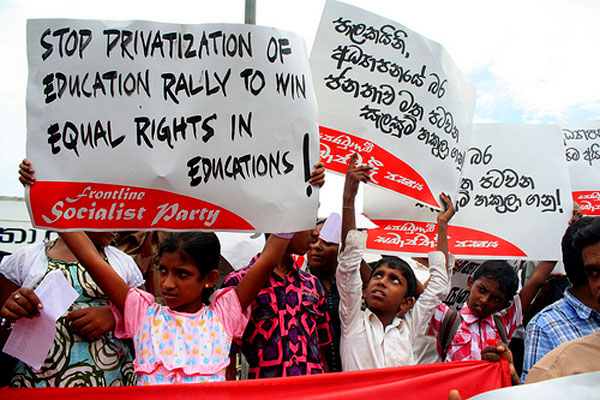Reply To:
Name - Reply Comment

By Athulasiri Kumara Samarakoon
Prof. Chula Goonasekera’s thoughtful piece titled “Bad Side of Free Education” published recently in a weekend newspaper invites wider attention from policy makers and other stakeholders in the education sector. No doubt, it is a timely intervention to deal with a major issue facing this country today. Still some of the issues that the writer has raised in the article may not look that fresh, for the FUTA and its critics have dealt extensively on them, but require several careful re-readings; since meanings of conceptions can never be fixed or manipulated by the powers which govern.
Though not impressive enough, Prof. Goonasekera’s article has taken on some remedial measures for ills of free education as well. These solutions or similar to these are quite popular among technocrats of the government in reforming the system or opposition circles which aim to replace the ruling regime in future elections. For example the writer suggests that either the people should ‘denounce’ politicians who cannot run the system (sounding Platonic and heard from opposition benches) or the students should be given a repayable grant for educational expenses (technocratic idea of private funding, an idea emanating from neo-liberal reforms).
Here, while talking about available alternatives, the writer quite shrewdly shows us the access to ‘repayable grants’ could be the most possible alternative; since ‘denouncing’ bad politicians is the least possible task in any society, this seems a very (neo-)liberal alternative. Also the writer’s viewpoint on management of staffs, academic and non-academic, by way of keeping the most talented and efficient academics and removing the unproductive lot, and employing flexible mechanisms for administrative work approves the cost-cutting measures recommended by technocratic advocacy and not a novel idea anyway. However, the point that the education system requires ‘the best of the best’ to serve it remains a fundamental truth least supported by the rulers.
The good intentions of someone to reveal the ‘bad side of free education’, in the context of the government’s determined effort to hand over the job of producing and delivering education to the private sector inevitably can strengthen the attempts on redefining education as a ‘commodity’. And it is quite an intellectual misdemeanour on the public who are fed up with an inefficient state system and who for the time being fancy an efficient, uncorrupted private sector, which has no major social purpose other than profit maximization. Therefore the ‘bad side’ arguments serve the privatization efforts or can further strengthen the voices against free education. Hence, it represents, quite unfortunately, the interests of exploitative market-economics and egoistic politics.
If the ‘free education’ is a menace destroying people’s tax money which any government can spend on various other projects such as ‘industrial development’ or ‘security of the state’, then, absolutely it is a very bad for the entire state; not just on the ‘government’ which is a replaceable arrangement to run the state for a fixed period of time. This writer, being a statist, would like to distinguish the meaning of the State and the Government clearly. For me the state receives prominence over the government. And in Sri Lanka governments after 1977 mostly have taken education as a burden on them, but we need to question whether it has ever become a burden on the State.
The idea of the State as is shown by many is a wider conception and encompasses all the systems within it, including the government and free education. And if something or some phenomena becomes a ‘burden’ on the state, it is a question for all the systems within it; since it is the ultimate institution that we all, barring our politics, race, religion, caste etc., have been compelled to live in as social animals. However, the falsity of propagation of free education as a ‘burden on the state’ is an egoistic myth promoting the interests of a certain class which can afford to buy even an entire government. And this fallacy is what the advocates of privatized education reverently use and politicos talks about lamenting on the soaring state expenditures.
Prof. Goonesekara and most of the others who support the idea that there should be a drastic restructuring of free education mostly find justification for attacking it on this argument, that it is an unnecessary burden on the government expenditure. However, there has not been a dialogue from those who want to debunk the thesis of free education about its contribution for the state building, the contribution it has made for the progress of the modern nation state, its democratic apparatuses and its entire function as the life giver of the system. Free education, because it was provided free has today made this state what it all looks like, its whole identity as a space of cultured human beings. The enormity of civilizational dimension of education is what is ignored ignorantly by the reductionists who superficially talk about its unbearable expenditure on the government. If someone really wants to talk about the bad side of something, he/she can freely choose among thousands of other topics; but when that choice becomes ‘free education’, at this hour, indirectly it strengthens the forces aiming to annihilate this system.
| " If the ‘free education’ is a menace destroying people’s tax money which any government can spend on various other projects such as ‘industrial development’ or ‘security of the state’, then, absolutely it is very bad for the entire state; not just on the ‘government’ which is a replaceable arrangement to run the state for a fixed period of time " |